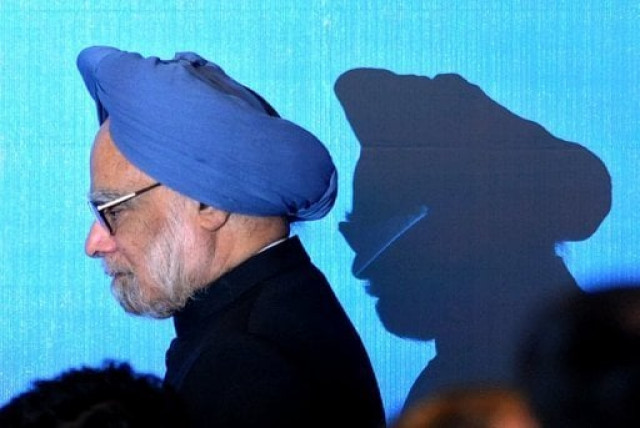Key political risks to watch in India
Most observers expect continued policy paralysis due to inflation and a raft of corruption scandals.

Few expect any quick progress on economic reforms such as a national goods and services tax or opening up the retail sector to foreigners, as the resurgent main opposition Bharatiya Janata Party (BJP) takes on the ruling Congress party.
Here is a summary of political risks to watch in India:
Inflation
India has been unable to deal with high inflation despite identifying it as a top priority. Public anger is rising and with crucial state elections around the corner, the government could slip into costly populism and put reforms on the backburner.
Wholesale price inflation , at 8.23 per cent in January, is one of the highest in Asia and analysts are skeptical of the government's forecast for headline inflation to ease to 7 per cent by March.
High food prices, the major inflationary component, have sparked off huge street protests against the Congress-led coalition government and could dent its fortunes in state elections later this year.
Trade unions marshalled more than 100,000 people in New Delhi in late February to protest against inflation, the largest demonstration in recent times.
The risk is that high prices could push back reforms such as freeing diesel prices. Prime Minister Manmohan Singh's top economic adviser has said that this measure is likely only after inflation falls to 6 per cent.
The government could also pressure state-set oil retailers not to raise petrol prices, freed up in June, raising its subsidy bill. Measures to trim food subsidies could also be deferred.
Inflationary pressures could boost the hawkishness at the RBI and prompt further rounds of rate hikes. It has raised rates seven times since last March and analysts expect another 25 basis point increase when the bank reviews policy on March 17.
Authorities also worry that too-tight monetary policy could hurt growth and break India's near 9 per cent economic expansion.
What to watch:
Statements from officials, advisers and central bankers on inflation and policy responses.
Government data, including weekly food inflation, headline inflation and industrial output, which will provide a gauge of the impact of policy action.
Protests across the country over prices.
Protests in the Arab world. If unrest in the Middle East continues and sends oil prices higher, inflation may grow even more severe.
Corruption
The second term of Prime Minister Singh has seen a raft of high-profile corruption cases, and as his government seeks to contain the political fallout, it is increasingly sidetracked from pushing forward reforms.
The government has said it is working to trim powers of ministers and fast-track the prosecution of corrupt bureaucrats, and there is anecdotal evidence some officials are attempting to stay out of trouble by sitting on decisions that could later be questioned.
The BJP forced the government to accept a demand for a cross-party probe into a multi-billion dollar telecoms corruption scandal, potentially the country's largest ever.
A former telecoms minister has been arrested and top business moguls have been investigated on charges bribes were paid to favour some firms when mobile phone licences were issues in 2008.
The probe has weighed on the Mumbai stock market and the benchmark index has been one of the world's worst performing so far this year.
Other scams include charges of graft in the 2010 Commonwealth Games, allegations officials at state-run banks took bribes to issue loans to companies, and bureaucrats taking over for themselves posh apartments meant for war-widows.
What to watch
Measures taken to curb graft.
Arrests or questioning of key officials or businessmen.
March 31 deadline for police to file charges over telecoms case.
Regulatory risk
Investors are keenly watching the telecoms ministry as it considers revoking several mobile phone licences and slapping firms with steep bills for the radio spectrum they use, decisions that could question the stability of government policy.
An adverse decision for firms could affect foreign investment into India, especially in the telecoms market which is the world's second-largest and fastest growing.
The ministry had asked five firms, including the Indian units of Telenor and Etisalat , to respond to the state auditor's charges they were not eligible for the licences issued in 2008. All firms have defended their licences.
The government is also studying a recommendation from the telecoms regulator to lift the price of airwaves and charge firms a one-off payment for some spectrum they were allotted years ago.
The proposals have been slammed by top operators like Bharti Airtel and the chief executive of Vodafone Essar, the local unit of Vodafone , has called the proposals "flawed, illogical" and "discriminatory" against older operators.
In contrast, the environment ministry has seemingly softened its earlier aggressive stance against big business, approving South Korean steelmaker POSCO's $12 billion steel plant after years of delays.
What to watch:
Statements from the telecoms ministry on policy.
Decision on licences and spectrum charges.
Diplomacy and security
Indian and Pakistani home secretaries will meet on March 28-29 as the two nuclear rivals try to renew peace talks, crucial to the United States' strategy to stablise Afghanistan.
Peace on Pakistan's eastern border with India could make Islamabad more amenable to move troops to the western frontier and aid Washington's battle against Islamist groups in Afghanistan.
A truce is also key for India's efforts to calm separatistprotests in the disputed Kashmir region. A flare-up in tensions between the neighbours could lead to violence in Kashmir, similar to that of the last summer when more than 100 people were killed.
India remains vulnerable to militant strikes like the 2008 Mumbai attacks, which New Delhi blamed on Pakistan-based actors. Similar attack could provoke a hardening of stance and would freeze dialogue.
What to watch:
Results of the home secretaries' talks and comments from diplomats and officials that take forward the dialogue.
Security warnings of possible militant attacks.






1725099588-0/BeFunky-(41)1725099588-0-208x130.webp)












COMMENTS
Comments are moderated and generally will be posted if they are on-topic and not abusive.
For more information, please see our Comments FAQ